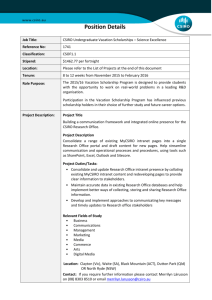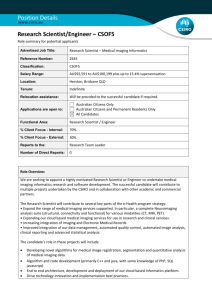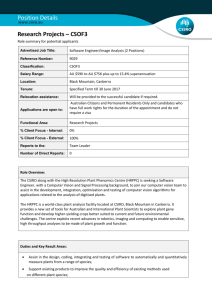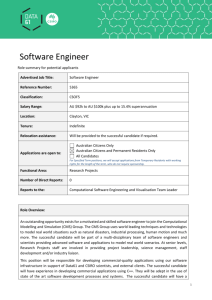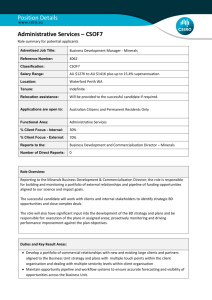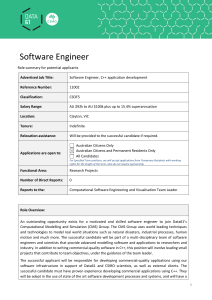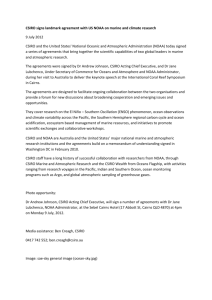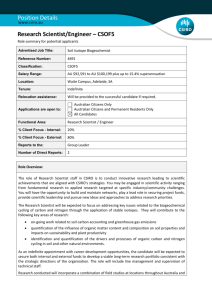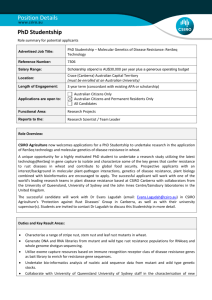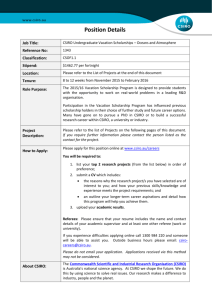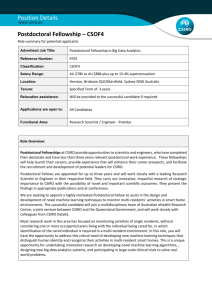Postdoctoral Fellow – Neonatal Imaging
advertisement
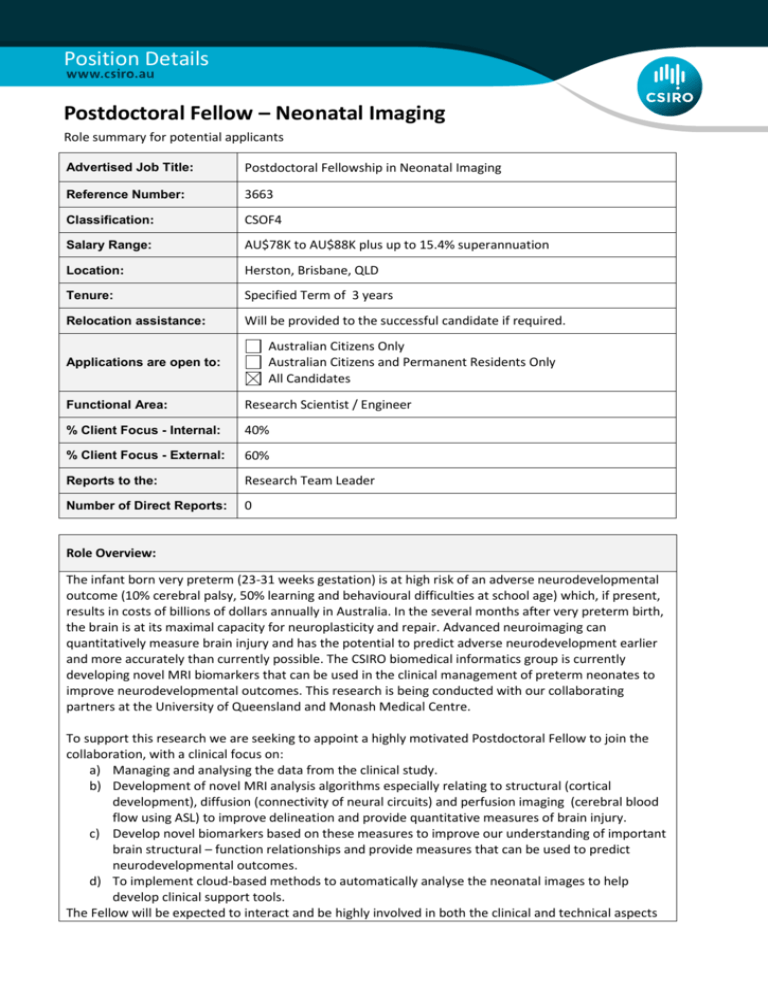
Position Details Postdoctoral Fellow – Neonatal Imaging Role summary for potential applicants Advertised Job Title: Postdoctoral Fellowship in Neonatal Imaging Reference Number: 3663 Classification: CSOF4 Salary Range: AU$78K to AU$88K plus up to 15.4% superannuation Location: Herston, Brisbane, QLD Tenure: Specified Term of 3 years Relocation assistance: Will be provided to the successful candidate if required. Australian Citizens Only Australian Citizens and Permanent Residents Only All Candidates Applications are open to: Functional Area: Research Scientist / Engineer % Client Focus - Internal: 40% % Client Focus - External: 60% Reports to the: Research Team Leader Number of Direct Reports: 0 Role Overview: The infant born very preterm (23-31 weeks gestation) is at high risk of an adverse neurodevelopmental outcome (10% cerebral palsy, 50% learning and behavioural difficulties at school age) which, if present, results in costs of billions of dollars annually in Australia. In the several months after very preterm birth, the brain is at its maximal capacity for neuroplasticity and repair. Advanced neuroimaging can quantitatively measure brain injury and has the potential to predict adverse neurodevelopment earlier and more accurately than currently possible. The CSIRO biomedical informatics group is currently developing novel MRI biomarkers that can be used in the clinical management of preterm neonates to improve neurodevelopmental outcomes. This research is being conducted with our collaborating partners at the University of Queensland and Monash Medical Centre. To support this research we are seeking to appoint a highly motivated Postdoctoral Fellow to join the collaboration, with a clinical focus on: a) Managing and analysing the data from the clinical study. b) Development of novel MRI analysis algorithms especially relating to structural (cortical development), diffusion (connectivity of neural circuits) and perfusion imaging (cerebral blood flow using ASL) to improve delineation and provide quantitative measures of brain injury. c) Develop novel biomarkers based on these measures to improve our understanding of important brain structural – function relationships and provide measures that can be used to predict neurodevelopmental outcomes. d) To implement cloud-based methods to automatically analyse the neonatal images to help develop clinical support tools. The Fellow will be expected to interact and be highly involved in both the clinical and technical aspects of the project. To succeed, will require high motivation, time management and ‘collaboration’ focus, especially on the day to day management of the study. To be successful in this role you will be enthusiastic about making a hands-on contribution to solving the research challenges in neonatal medical image processing. In addition, the Fellow is expected to develop their algorithms and software using high quality software engineering process in C++ within our MILX platform, for potential commercialization. The successful candidate will work at the AEHRC, in the Clinical Imaging Team - currently comprising a number of scientific staff and PhD students, within the Biomedical Informatics Group, e-Health Program of CSIRO Health and Biosecurity. Weekly interactions with key collaborators occur, with whom in many cases you’ll work directly. The candidate is expected to collaborate with the other team members to support the prototyping and commercialisation of the developed technologies. This is a great opportunity for the successful candidate to work with other innovative researchers in a leading government organisation which is engaged in world class scientific research projects, and offers excellent career development and professional support. The successful candidate will have a unique opportunity to translate their research into practice with impact on both Australian and international eHealth programmes. Duties and Key Result Areas: Develop novel algorithms for the analysis of neonatal MR images that enable quantitative measures of cortical, subcortical and white matter development from preterm (30 weeks) to term equivalent age (40 weeks). Develop quantitative imaging metrics based on structural MRI (brain volumetrics), diffusionweighted MRI (connectivity of neural networks) and ASL (cerebral blood flow) to provide improved measures of brain structure –function relationships. Develop innovative tools related to the management, cloud-based processing and analysis of the neonatal clinical imaging data. Publish results in leading clinical and technical journals and present research to both technical and non-technical audiences at national and international conferences. Grow and maintain scientific citizenship, and collaborations with international and local partners. Investigates underlying issues of complex and ill-defined problems and develops appropriate responses by adapting/creating and testing alternative solutions. Supervise and mentor junior researchers and students. Incorporate novel approaches to scientific investigations by adapting and/or developing original concepts and ideas for new, existing and further research. Communicate effectively and respectfully in the interests of good business practice, collaboration and enhancement of CSIRO’s reputation. Work effectively as part of a multi-disciplinary, often regionally dispersed research team, to undertake independent scientific investigations and carry out associated tasks under the guidance of more senior Research Scientists/Engineers. Under the guidance of Senior Research Scientists/ Engineers, work collaboratively and develop trust with internal and external colleagues, clients and partners to help define and satisfy objectives for small to medium research projects. Adhere to the spirit and practice of CSIRO’s Values, Health, Safety and Environment plans and policies, diversity initiatives and Zero Harm goals. Undertake an appropriate training and development program developed by CSIRO. Other duties as directed. CSIRO’s postdoctoral training program is developed between the Postdoctoral Fellow and a CSIRO scientist. The program will focus on enhancing the Fellows’ capabilities to the level expected of an independent researcher and will include on-the-job and course-based development encompassing: Discipline-specific techniques and protocols Professional growth Project management Communication and influencing skills Working and collaborating with others http://www.csiro.au/Portals/Careers/Postdoctoral-Fellowships/Postdoctoral-Fellowships.aspx Selection Criteria: Under CSIRO policy only those who meet all essential criteria can be appointed Pre-Requisites: Education/Qualifications: A doctorate (or will shortly satisfy the requirements of a PhD) in a relevant discipline area, such as medical image analysis. Background in statistical analysis, medical physics (MRI), and design of clinical studies. Please note: To be eligible for this role you must have no more than 3 years of relevant postdoctoral experience. Communication: Strong written and oral communication skills including the ability to publish research results, prepare reports, and present the results of scientific investigations at national and international conferences and stakeholder meetings. Publications: A solid record of publication in quality, peer reviewed journals. Collaboration: A history of professional and respectful behaviours and attitudes in a collaborative environment. Essential Criteria: 1. Demonstrated competency in research within a clinical environment, knowledge of medical imaging, especially relating to neonatal applications, image analytics, and imaging biomarkers. 2. Demonstrated competence and experience in the analysis of diffusion-weighted MRI to measure white matter injury and development. 3. Demonstrated competence and experience in problem solving and application of knowledge, as evidenced by publications and research experience. 4. Demonstrated experience of advanced programming skills (e.g., Java, C++) for image analysis. 5. Proven ability to work independently and as part of a team to prototype research ideas and develop them into demonstration and/or proof of concept systems. In addition, a demonstrated ability to interact with external/internal collaborators and stakeholders. 6. A record of science innovation and creativity, plus the ability and willingness to incorporate novel ideas and approaches into scientific investigations. Desirable Criteria: 1. Neuroimaging expertise (structural, diffusion and perfusion MRI). 2. Knowledge of clinical areas related to neonatal brain development. 3. General knowledge of neuroanatomy. CSIRO is a values based organisation. You will need to demonstrate behaviours aligned to our values of: Integrity of Excellent Science Trust & Respect Creative Spirit Delivering on Commitments Health, Safety & Sustainability Other special requirements: Appointment to this role may be subject to conditions including security/medical/character clearance requirements. Applicants who are not Australian Citizens or Permanent Residents may be required to undergo additional security clearance processes; which may include medical examinations and an international standardised test of English language proficiency (i.e. IELTS test).http://www.ielts.org/default.aspx Other Information: How to Apply Please apply for this position online at www.csiro.au/careers. You may be asked to provide additional information (online) relevant to the selection criteria. If so, then responding will enhance your application so please take the time to provide relevant succinct answers. Applicants who do not provide the information when requested may not be considered. If you experience difficulties applying online call 1300 301 509 and someone will be able to assist you. Outside business hours please email: csiro-careers@csiro.au. Referees: If you do not already have the names and contact details of two previous supervisors or academic/ professional referees included in your resume/CV please add these before uploading your CV. Contact: If after reading the selection documentation you require further information please contact: Jurgen Fripp via email at jurgen.fripp@csiro.au or phone: +61 7 3253 3660. Please do not email your application directly to Jurgen Fripp. Applications received via this method will not be considered. About CSIRO: Australia is founding its future on science and innovation. Its national science agency, the Commonwealth Scientific and Industrial Research Organisation (CSIRO) is a powerhouse of ideas, technologies and skills for building prosperity, growth, health and sustainability. It serves governments, industries, business and communities across the nation. Find out more! www.csiro.au. CSIRO Digital Productivity is focussed on Australia’s productivity challenge. We use data and digital technologies to address economic and developmental challenges. By building on our legacy in computer science, engineering, statistics and mathematics, we realise and extend the potential of our increasingly interconnected, digitised, and automated world. For further information on CSIRO Digital Productivity and the Australian e-Health Research Centre please visit www.csiro.au/Organisation-Structure/Flagships/Digital-Productivity-and-Services.aspx and www.aehrc.com respectively for more information.
